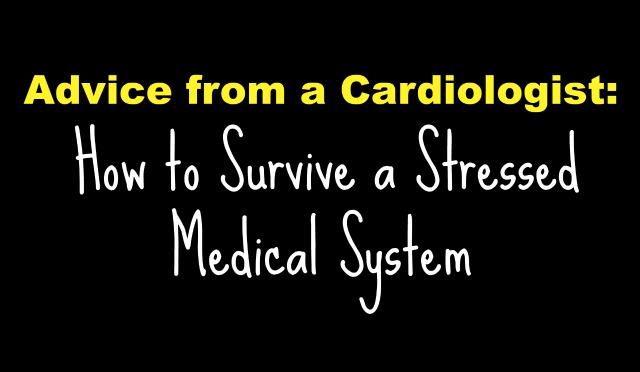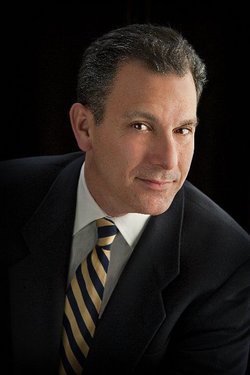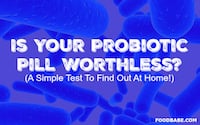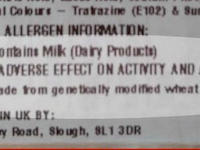This guest post reminds me of the time an emergency room doctor sent me home with the advice to take some Advil, only to find out the next day, my appendix was about to burst! I am so thankful for this advice from Dr. Joel Kahn, who serves on my Advisory Council. Dr. Kahn is a practicing interpreventional cardiologist who also writes for Reader’s Digest and has taught dozens of residents and cardiologists. I am thrilled to have him as a contributor here!

I do not want to burst your bubble, but the medical system is under severe stress and serious mistakes happen daily. Some of these mistakes are lethal and I do not want you to be one of them. The latest report indicates that medical errors are the third leading cause of death in the United States exceeded only by heart disease.
During the week I wear several different hats. One is my medical career where I currently practice an aggressive brand of preventive cardiology and heart disease reversal. Another is that I am asked frequently to review records from other doctors and hospitals where patients have experienced bad outcomes, often death. I serve as an impartial medical expert. Just this week I reviewed a file of a 50-year old male smoker who went to the emergency room with 2 days of new and intermittent chest pain. He had minimal testing and was released in an hour with instructions to see his family doctor in a week. Sadly, he died of a heart attack 3 days later. This is all too common.
While not all deaths can be foreseen and prevented, I have created a list of questions to ask or testing to request from your health care providers in hopes that it will prepare you for dealing with this overtaxed medical complex and protect you from heart damage.
1. I want advanced labs.
In my 30 plus years of training and practice, you are likely to have the same lab tests at an annual physical now as in the 1970s. This is not acceptable as there have been major advances in assessing your physiology by labs. I would suggest you ask for the following tests:
Advanced lipid profile: Rather than a calculated LDL cholesterol level, advanced panels measure LDL particle number and size which are more predictive of future heart and stroke events. Two individuals with a calculated LDL cholesterol level of 150 mg/dl can have widely different particle and size measurements and have very different risks.
Lipoprotein a: This is a genetic form of cholesterol that is elevated in about 20% of those tested. It is rarely drawn even though hundreds of research studies indicate if it is elevated, the risk of heart attack and stroke skyrocket. There is even a foundation dedicated to educating the public of the risk. In my clinic, when lipoprotein a is elevated, I work to make sure all other risks for heart and stroke are managed but I also have a protocol to lower and neutralize the effects on arteries.
Homocysteine: This amino acid is produced by an important process called methylation. It is important for artery and brain health along with decreasing risk of autism and cancer. When elevated, it may be due to a genetic defect in the MTHFR gene which is also easily measured. It can be treated with methylated B complex vitamins and the level will return to normal.
Inflammatory markers: The best known is hs-CRP but there are 5 others I measure in my practice. If there are markers of inflammation in the blood, a hunt is on for infections, food allergies, skin conditions like psoriasis, a diet rich in processed foods, central obesity, gingivitis, and sleep apnea among others. Inflammation can be reduced by addressing these root causes.
TMAO: This is a newly described marker of heart and kidney health and rises both by meat and egg heavy diets and an altered gut microbiome. It has now been conclusively shown to cause heart and kidney damage and is associated with a worsened prognosis. It may give an impetus to transition to more plant based diets.
ECG: Years ago a routine physical included an electrocardiogram (ECG or EKG) but this may be skipped nowadays. I suggest it for one particular reason, the measurement called the QT interval. A segment of the population has a genetic defect that causes the QT interval to be prolonged. Some people are prescribed drugs that prolong the QT interval. A long QT can result in death from a cardiac arrhythmia and a number of medications have been pulled off the market due to this risk. Knowing if you have a prolonged QT interval before you are prescribed antibiotics, antidepressants and other medications is key. More can be learned at www.sads.org.
Vascular screening: Many hospitals offer a vascular screening program using ultrasounds of the carotid arteries, abdominal aorta and legs. These may cost between $50-$100 although for about twice that similar screenings are done in churches and workplaces. Although they are rarely definitive, they can offer a good value if you are a smoker or have a strong family history of early heart disease or stroke of the status of your arteries. Arteries should have no plaque so the word “mild” plaque should prompt you to have a complete evaluation by a vascular expert.
Coronary artery calcium scan (CACS): A CACS is by far the most accurate way to determine if your heart arteries are silently suffering. The heart gives no warnings until the arteries are badly blocked and the first symptom you have may be the day you die. Do not wait. In my community this 1 minute CT scan costs $80, uses no dye, and takes 1 minute. It is far more accurate for screening your heart than a stress test. My book “Dead Execs Don’t Get Bonuses“ goes into detail on how this test works. Your score should be zero and anything higher should prompt you to see a preventive cardiology expert.
2. Do not leave an ER without a complete evaluation.
There is a chance you or a loved one will end up in an emergency room (ER) or urgent care clinic with chest pain symptoms needing evaluation. First, do not go to an urgent care clinic with chest pain, pressure, tightness, squeezing, or compression. Go to an ER. However, the ER has pressure on them to turn over the rooms. I have reviewed dozens of charts with young people sent home with cursory evaluations only to die or be maimed by massive heart attacks within days. Tragic. Do not go home without a thorough evaluation.
Second, ask for “serial” cardiac enzymes that are repeated every 4-6 hours for 2-3 times.
Third, ask for a repeat ECG to compare to the one you presented with.
Fourth, ask for a definitive test before discharge. This may be a treadmill stress test with echocardiography (no radiation) or nuclear imaging (radiation). In some ERs, the CACS or more likely the more advanced coronary CT angiogram may be available. If you are not severely allergic to iodine dye, this is by far the most accurate way to be sure your arteries are clean. If they are not clean, a cardiologist will have to evaluate your status but you will know the score and be alive.
3. Be wary of drug interactions.
There are so many potential drug interactions and some of them are deadly. Some of them center on the long QT syndrome found on your ECG mentioned above. There are online resources to check your list of medications for interactions, particularly if you are prescribed a new medication. Antibiotics are particularly frequent causes of drug interactions that can be avoided with proper research online.
While I favor natural medicine and therapies emphasizing healthy lifestyle choices, there are genetic and acquired health issues that can be identified and addressed with proper evaluations.
I have focused on heart issues as they are the focus of my quarter century of practice, but these lessons are true of other conditions (e.g. a bad headache not fully evaluated in the ER). Do not be afraid to challenge, ask why, read online, and refuse to go home before proper testing is performed. My hope is that I never am sent a medical chart to review with your name on it. The best way to not be a statistic of the third most frequent cause of death in the U.S is to take excellent care of your health, have proper preventive testing, and stay out of ERs and hospitals unless very ill.
More About Joel Kahn, M.D., FACC, FSCAI

Dr. Kahn is a cardiologist who has launched a campaign to prevent 1 million heart attacks. His brand of cardiology combines the best of Eastern and traditional therapies for total healing. He is known as “America’s Holistic Heart Doc” and graduated Summa cum Laude from the University of Michigan, Ann Arbor. Dr. Kahn has been practicing invasive, interventional and preventive cardiology in Detroit since 1990, and was advanced to full Clinical Professor of Medicine (Cardiology) at Wayne State University School of Medicine and Associate Professor of Medicine at Oakland University Beaumont School of Medicine. He is devoted to his patients who take pride in his passion for teaching and prevention. Reader’s Digest magazine selected Dr. Kahn for their Holistic Heart Doc column and their publishing arm published his book, The Whole Heart Solution, in 2014. His second book, Dead Execs Don’t Get Bonuses, was published in 2015 and both are bestsellers. He appears regularly on Fox TV 2 in Detroit as a health commentator. He has been nominated as a Top Doc in cardiology for most of the past years. In 2013, he received a certification from the University of South Florida in Metabolic Cardiology, and became the first physician to complete the program in the world. To learn more about Dr. Kahn, visit drjoelkahn.com.








Dear Vani/Dr. Kahn,
THANK YOU!! This post is so important and informative. I will definitely be requesting these tests at my next physical. I know all too well about the importance of being your own advocate when dealing with the healthcare industry. I was told that “everything looked good” when I was 38 weeks pregnant and if I had not of pushed the doctor and told her I thought my blood pressure looked high, I would have been sent home and could have died. The doctor had not even looked at my chart before coming in the room! When she did, she ordered me to be admitted to the hospital to deliver that day. I had a severe case of preeclampsia and they induced me that evening.
Thanks for this article! Please keep posting things like this!
Best regards,
Kristen
Thank you for your supportive comments. I am glad you overcame your eclampsia. Watch your blood pressure in coming years to make sure you do not develop hypertension. Please ask your doctor for these tests and follow the Food Babe Way to better health! I do.
Even though I’m afraid of the emergency room, when my dad was having chest pain he wanted to go to one of the urgent care clinics and I was on the line saying, please no!!!! Just go to the hospital. And yes, mistakes totally happen! I’ve worked with enough doctors especially with pregnancies that I realize, mistakes happen. Doctors aren’t perfect and we shouldn’t expect them to be. However…..we have to watch every move carefully, advocated for ourselves and use our sharpest instincts when discussing treatments. If something doesn’t seem right, don’t hesitate to ask! We’ve avoided lots of medical mistakes but just being assertive.
My 49 year old smoker husband went to the local er after 3 episodes of chest pains. He had an abnormal ekg and was kept overnight. Since they didnt do stress tests on sindays, they sent him home with instructions to sched a stress test with his primary care. Almost a week later after an awful time scheduling the appt he ended up with a stent due to 90% blockage of LAD!! Boy do they make mistakes!
It has been stated that “medical errors are the third leading cause of death in the United States;” but what that really means is that medical errors are OFFICIALLY ACKNOWLEDGED as the cause of death only that often.
But how many cases are there like mine? If, after my first relatively mild heart attack, angioplasty and stent, I had had the good fortune of finding someone like Dr. Kahn to be my cardiologist, I would probably never have had a similar second heart attack four years after that, let alone a third one three years later that very nearly killed me and required an emergency bypass operation. A competent cardiologist would have found the inflammatory markers after my first heart attack, searched for the underlying cause, and ultimately would have sent me to a holistic dentist to have a seriously infected root canalled tooth removed. Had I not had the good fortune of eventually stumbling across a holistic dentist by chance, who connected the dots for me and pulled that dead tooth, it is very likely I would have had a fourth and possibly fatal heart attack by now, six years after my third one. Would my death have been attributed to a “medical error?” Of course not. It would have been recorded as death by heart attack.
There are also probably more people who die each from the side effects chemotherapy than there are who die from cancers that could have been put into remission or completely cured with appropriate treatment, or were simply misdiagnoses of benign tumors and not really cancer at all. Are any of those deaths attributed to “medical error?” Of course not. They are all recorded as deaths from cancer.
The bottom line is, if we were to count as a “medical error” every case where a death occurs that could easily have been prevented by appropriate medical treatment provided by someone like Dr. Kahn, then the number of deaths caused by “medical error” would probably be recorded as being more than the number of deaths caused by heart disease and cancer combined.
What a great article with such important information! Thanks Food Babe and Dr. Kahn, definitely sharing this post and saving it.
Thanks for this educational article . I went to the cardiologist and EKG and Echo didn’t show anything only after stress test with contrast showed that I have blockage and need for catarathation and stent blockage was 90%.
Dr. Kahn (and Food Babe) thank you for this article.
After I was ambulanced to ER with intense chest pain, (even though I have extensive family history of ‘young’ heart attack/stroke) they found nothing. When I had the follow-up with my new-to-me doctor, it was worse than the ER. When I asked for specific testing to be done, this Doctor told me, “there is no need, you were just experiencing stress”. I felt unheard, unimportant and powerless…and lost faith in the AMA system. I never returned.
Armed with all this information (and learning that there is such a thing as a “vascular expert”) I might just choose to give some other Doctor a try…
Thank you for sharing your expertise
If you ever give recommendations for how to choose ‘good’ doctors (or know any in the San Diego CA area) I would be grateful for the added information : )
@claire: I would do a google search for ‘functional medicine san diego’
Great article from the distinguished doctor and it is good to see that Food Babe is reaching out to the experts in the medical field (( M.D. )) arena. The more doors that are open for sincere and realistic communication the better for all Americans. No guarantees but I believe that so many of the folks that end up in ER would not be there if they had lived wisely with regards to avoiding the American Pro-Inflammatory Diet. Most Americans are eating foods that are harmful. The real issue/reality is that if anyone eats regularly from processed foods, crops laden with chemical toxins, soil degradation, denatured water, daily assaults from chemicals found with the bedroom, bathroom and kitchen have been and are catalysts for residual degrading the human matrix; physically, mentally, emotionally and spiritually. Big business whether government, Pharmo, the medical system, health insurance, big agriculture and or politicalized corporate corrupt misinformation all have a collective detrimental impact on the overall health/well being of all Americans! Why do you think that seven of the top ten killers of Americans today are caused by chronic inflammation and that inflammation is caused by diet!!! Why do you think that the United States is NOW the 34th healthiest nation?/? Why do you think that 117 million American adults today are now suffering from at least one chronic disease attributed to a bad diet?/! Why do you think that over 92% of all Americans today want clear and legible labeling of foods yet Congress approved the ‘Dark Act.’ Bottom line. . . you can not afford to rely on anyone but yourself to take care of business and protect yourself, family and your community!!! You must become Pro=Active!!! Bottom line. . .LEARN//ASK QUESTIONS// EDUCATE YOURSELF to eat Organic, follow blood type diet, follow food combining, drinking enough clean water daily(( 1/2 your weight in ounces of water//day)) daily exercise, learn life style reduction of stress, daily exercise, learn/practice a spiritual lifestyle and educating yourself by reading several nutrition books yearly. . . These are a few of the arrows within your quiver that will keep you healthy, happy and out of your local ER. Why//How can I say this ?/! ?/! ?/! If you do your homework. . . you will find out/understand/realize that we have been given a body, a mind, an emotional body and a spirit that has the INNATE ABILITY//GIFT to heal itself IF GIVEN THE CHANCE !!! What you eat and drink will make OR break you !!! You must make that decision daily !!! It has been said for quite some time,” Let thy medicine be thy food and thy food be thy medicine and an ounce of prevention is worth a pound of cure!” Take it one day at a time and one meal at a time . . .WIN the war! Go get your health back and your life!
Go make it happen !!!
jpakdc
p.s. ‘Nobody makes an apple like HIm!!!’
THANK YOU for being honest about the problems in the medical field today and being willing to help people. Thank you Vani for presenting this article!
As an RN that works in an ER, a lot of these tests are for your PMD to do. We have no reason to do these in an emergent situation. Stop spreading this nonsense.
What I would give for 10 minutes of Dr. Kane’s time. My father is 88 and has A-FIB, high blood pressure and still recovering from a stroke in March of 2014. Every time we visit my father’s Cardiologist, we feel rushed. As his daughter and primary caretaker, I have so many questions on what specific vitamins, supplements, food choices, physical activity and overall care my father should take to enrich, repair(if possible) and prevent the health of his heart. My dad has spent his life giving to others and contributing to the betterment of people’s lives. He desperately wants to live as long as he possibly can and I am trying to help him by constantly researching on the internet to gather the best information. I have tried to go over a list of questions with his Cardiologist, who by the way, is a top rated doctor in our town, but he keeps telling me “that’s not necessary” or “just continue his meds”. It’s very frustrating. Dr. Kane is the epitome of the perfect doctor that is forward thinking, out of the box and truly wants his patients to have the best care to live as long as possible. I wish we lived close to Dr. Kahn. My sincerest thanks to Dr. Kahn for going above and beyond to give his patients the best possible care. Also, a big thank-you to Foodbabe for reaching out to the best and the great comments from other people on this thread. Wishing you all healthy and happy holidays. ?
My apologies for misspelling Dr. Kahn’s name several times.
What I would give for 10 minutes of Dr. Kahne’s time. My father is 88 and has A-FIB, high blood pressure and still recovering from a stroke in March of 2014. Every time we visit my father’s Cardiologist, we feel rushed. As his daughter and primary caretaker, I have so many questions on what specific vitamins, supplements, food choices, physical activity and overall care my father should take to enrich, repair(if possible) and prevent the health of his heart. My dad has spent his life giving to others and contributing to the betterment of people’s lives. He desperately wants to live as long as he possibly can and I am trying to help him by constantly researching on the internet to gather the best information. I have tried to go over a list of questions with his Cardiologist, who by the way, is a top rated doctor in our town, but he keeps telling me “that’s not necessary” or “just continue his meds”. It’s very frustrating. Dr. Kane is the epitome of the perfect doctor that is forward thinking, out of the box and truly wants his patients to have the best care to live as long as possible. I wish we lived close to Dr. Kahn. My sincerest thanks to Dr. Kahn for going above and beyond to give his patients the best possible care. Also, a big thank-you to Foodbabe for reaching out to the best and the great comments from other people on this thread. Wishing you all healthy and happy holidays. ?
I like that you point out to never leave the ER without a complete evaluation. I can see why this would be really important to make sure you are in good condition to leave. My grandpa has the occasional heart tremor and has to visit a cardiologist frequently. I’ll have to make sure my mom knows about this if they have to go to the ER.
No one has mentioned that if the patient asks for advanced tests, will the extra testing be covered by insurance? My angiogram and stent ran over $67,000. Insurance covered all of it, but I wonder if they would have covered additional tests that I, and not necessarily the physician, wanted. Unfortunately, I don’t think hospitals will go ahead and do extra testing unless the patient can pay for it.